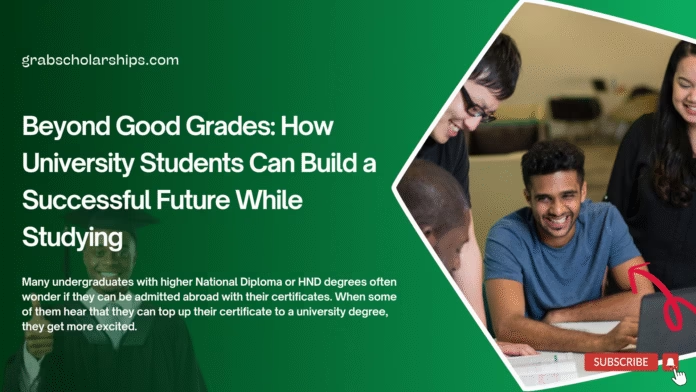Beyond Good Grades: How University Students Can Build a Successful Future While Studying; Not long ago, a friend asked me where I learned how to build the website I was working on. That question sparked a memory of my own journey through university—how I balanced academics with developing skills that would serve me long after graduation.
When most students enter university, they are told the same advice over and over again: work hard, get good grades, do your assignments on time, and aim for the highest GPA possible. While this is valuable advice, it is only one part of the bigger picture. Good grades may help you secure a transcript, but they do not always guarantee a stable job or fulfilling future.
This article is your guide to looking beyond the classroom. We will explore why grades are not enough, how to identify your passions, and how dedicating just one or two hours daily to a side project can completely change your life after graduation. Whether you dream of becoming a successful entrepreneur, professional athlete, creative artist, or leader in your field, this guide will show you how to build that future while still in school. Before diving in, Find scholarships to finance your study here.
The Academic Obsession – Why Grades Are Not Enough
Let’s be honest: grades matter. They reflect your discipline, hard work, and ability to grasp academic concepts. Many scholarships and initial job opportunities rely heavily on transcripts. But here’s the reality—when you graduate, you are not competing alone.
- In your class, you may have 100 students all working for the same degree.
- Across your faculty, there may be hundreds more.
- At graduation, you’ll compete with thousands of graduates nationwide, all entering the same job market.
If everyone comes out with a similar degree and comparable GPA, what makes you stand out? Employers and organizations increasingly look for something beyond grades: creativity, leadership, problem-solving ability, and real-world skills. That’s where building something outside academics becomes essential.
The Overlooked Element – Building Something Beyond Grades
Balancing your degree with another pursuit is not about abandoning academics—it’s about parallel growth. This means dedicating yourself to your studies while also investing in a passion or skill that sets you apart.
Think about successful individuals who started early:
- A student who began designing websites in their dorm room and later launched a tech company.
- A football player who trained daily while managing coursework, eventually joining a professional team.
- A food enthusiast who started a small catering service during university and turned it into a thriving business.
What they all have in common is that they didn’t wait until after graduation to start building. They invested time during their studies, so by the time they graduated, they already had momentum.
Identifying Your Passion and Potential
One common question students ask is: What should I focus on outside of my degree? The answer lies in your environment, interests, and long-term vision. Here are some paths you might consider:
- Sports (e.g., football, basketball, athletics): Develop discipline, teamwork, and commitment. Even if you don’t go pro, coaching or sports management can open doors.
- Creative Arts (writing, music, design): Hone your creativity while building a portfolio that can generate income.
- Business/Entrepreneurship: Start small—an online shop, tutoring, or digital services. Learn how to manage customers, finances, and growth.
- Food and Hospitality: If you love cooking, try catering, baking, or blogging about recipes. Food is always in demand.
- Technology/Blogging/Vlogging: Share your knowledge online. A blog, YouTube channel, or freelance digital service can grow into a sustainable career.
- Politics or Social Advocacy: Volunteer in clubs, speak up about issues, and build leadership skills early.
Actionable Tip: Write down three things you enjoy doing consistently. Ask yourself, “If I spent two hours every day on this, where could I be in three years?”
Balancing Studies and Passion Projects
The biggest challenge students face is time management. Assignments, exams, and projects can feel overwhelming. But here’s the truth: if you dedicate just 1–2 hours daily to your passion, you can build something remarkable.
Example Weekly Schedule:
- Weekdays:
- 2–3 hours for coursework.
- 1–2 hours for passion project (evening or early morning).
- Weekends:
- Longer “deep work” sessions (3–5 hours).
At first, this may seem impossible, but once you start treating your side project with the same seriousness as your assignments, it becomes part of your routine.
Remember: passion gives energy. While academics may tire you, working on something you truly enjoy can refresh your mind and keep you motivated.
The 6-Month, 1-Year, 2-Year Growth Model
Here’s a simple roadmap for balancing studies and passion projects:
- First 3 Months: Learn the basics. Understand the foundation of your chosen field.
- 6–12 Months: Start creating something tangible (blog posts, YouTube videos, football training progress, small business services).
- 1.5–2 Years: Begin earning or gaining recognition. By this time, your skills will have matured enough to attract opportunities.
- 3–4 Years (Graduation): You graduate not only with a degree but also with an established brand, business, or portfolio.
Practical Examples:
- A student starts a blog about technology in Year 1. By Year 3, they are earning from ads and freelance projects.
- Another student starts a home-based bakery in Year 2. By graduation, they have a loyal customer base and steady income.
- A football enthusiast trains consistently, and by graduation, they qualify for a semi-professional league.
Common Challenges and How to Overcome Them
- Distractions: University life offers endless social activities. Set boundaries and prioritize.
- Fear of Failure: Every successful journey starts small. Don’t wait for perfection.
- Limited Resources: Use free online tools (Canva for design, WordPress for blogging, Coursera for learning).
- Peer Pressure: Surround yourself with peers who support your vision rather than discourage it.
My Experience and Lessons Learned
I followed this plan during my university years. I focused on academics while also experimenting with projects like blogging and website creation. But distractions were everywhere, and at times, they slowed me down. Even so, the skills I built remain with me today—and they continue to open doors.
My lesson for you: consistency is more powerful than bursts of effort. If I had stayed consistent, I would be far ahead today. You can learn from my mistakes and reach levels far beyond mine.
Practical Tips to Start Today
- Make a plan: Write down clear, realistic goals.
- Start small: Don’t wait for big capital or perfect timing.
- Be consistent: 1–2 hours daily compounds over years.
- Use free platforms: WordPress, YouTube, Canva, social media.
- Track progress: Celebrate small wins to stay motivated.
- Network: Connect with like-minded students and mentors.
Why This Matters for Scholarships and Careers
Today, scholarships and employers look beyond grades. They ask: What makes this student unique? What impact have they made?
Students who build something alongside their degree show initiative, creativity, and leadership. This makes them more attractive to universities, employers, and investors.
Your side project could be the very reason you win a scholarship, land a job, or even start your own company.
University is more than just classes, exams, and grades. It’s a training ground for life. Good grades will help, but what will truly set you apart is what you build alongside them.
Start small. Dedicate two hours daily to that passion you’ve been postponing. Within three years, you could be graduating not just with a degree, but with a thriving business, recognized skills, or even financial independence.
The choice is yours: graduate with only a transcript—or graduate with a future.
Your journey starts today. What will you build alongside your degree?




